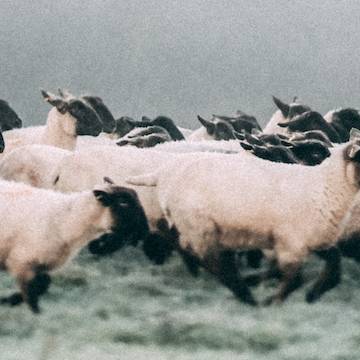
Native Breeds
We rear a Mule ewe crossed with a Suffolk ram, creating what we refer to as a 'Suffolk Cross’.
Most of our ewes are 'North of England Mule sheep' they are a framey, cross-bred sheep. Sired by a Bluefaced Leicester ram, the dam is a Swaledale - traditionally reared on the harsh northern fells and moors and noted for qualities of hardiness and longevity. The hybrid vigour produced by crossing the contrasting pure breeds results in the Mule retaining the best qualities of both. North of England Mules make excellent mothers, able to lamb with little human intervention. The are also very good grazers, used to converting rough unusable moorland grasses into protein and are naturally designed to grow slowly.

The Suffolk ram is prized for his ability to graze lush grass to lay down a good balance of fat to meat across the carcass. The combination of the two breeds, for us, creates the perfect balance of a sheep that does a very good job at nurturing our countryside and also has the perfect balance of characteristics to make exceptional meat.

Lambing
Lambing has been an integral part of the success of pastured farmland areas like Devon and Somerset for hundreds of years. Lambing is an exceptionally busy time for farming families, it is unrelenting and requires everyone to be on their ‘a-game’ to ensure the season runs smoothly. Once the sheep have successfully ‘tupped’ it’s important to regularly check the ewes to ensure they have enough grass and are safe and well. This is referred to as ‘lookering’ and is carried out several times a day by the Shepard or Shepardess.
Everything is calculated like a military operation on the farm. About 10 weeks before the ewes are due to lamb they are scanned to determine the lambing percentage. The ewes will be marked with a colour spray paint to determine whether they are carrying singles, doubles or triplets. The expectant mothers will then be sorted into corresponding groups.
When a ewe is with lamb, nutrition is incredibly important to ensure the health of both mother and her offspring. Deep-rooted pasture full of ‘5 a day’ nutrients make the best food for ewes to convert into energy for growing their embryonic lambs.
Our lambs are born from February (in the lowland flocks) to April (in the moorland flocks) and they run with their mothers for about 5 months. This means that they make full use of mother’s milk – nature’s best food, because it builds strong natural immunity in the lamb, and is a brilliant use of resources with the mother converting simple pasture and forage good enough for adults into superfood for growing lambs.
Our hardy North of England Mules make excellent mothers, they are capable of lambing healthy offspring with minimum fuss. Once the ewes have given birth they will ‘mother’ the newborn by licking their new babies completely clean. After a few minutes, the newborns will gainly wobble up on their new legs and stumble towards their mothers to suckle the vital colostrum (the first and incredibly nutrient-rich milk a new mother produces) from her full udder.
Grass Fed
Once weaned from natural mother's milk, our Suffolk lambs are weaned on to pasture and forage crops.
In the depths of winter, our sheep will eat silage cut from the farm and they might also have forage crops such as brassicas, turnips, fodder beet and kale.
Our lambs are grass fed and grass finished, eating pasture and forage for their entire lives.
The key to the best lamb is slow, natural growth to maturity, eating a natural diet without the use of any artificial, rapid fattening or growth promoters.

Slowly Reared
We grow our grass-fed lambs to between 8 and 15 months which means, depending on the time of year, they might be classed as hogget (a sheep aged between 12 months and 18 months). We think that slow growth and proper development of the animal makes the best type of meat as it benefits from a more intense depth of flavour and, after hanging for up to 3 weeks, a firm, mouthwatering texture.
“Hogget is simply lamb with wanderlust and a decent education. It’s killed when it’s between twelve and eighteen months old, so it knows a thing or two about flavour. It doesn’t overwhelm like old mutton, yet still bleats with ovine delight.” -Tom Parker Bowles, Let’s Eat Meat

Shop Our Grass Fed Lamb
By choosing our grass fed lamb you are helping us to build a thriving rural community, sustaining small scale abattoirs, investing in traditional artisan skills, nurturing our landscape positively creating resilience - all the while eating highly nutritious food that you can enjoy with total confidence.
Slow growing native breeds and farming in harmony with nature helps us to achieve consistent taste, texture and excellent marbling in all our grass-fed lamb. All of our grass-fed lamb is hung on the bone for up to three weeks, to develop a wonderfully rounded depth of flavour.
You can shop our Grass Fed Lamb here.
